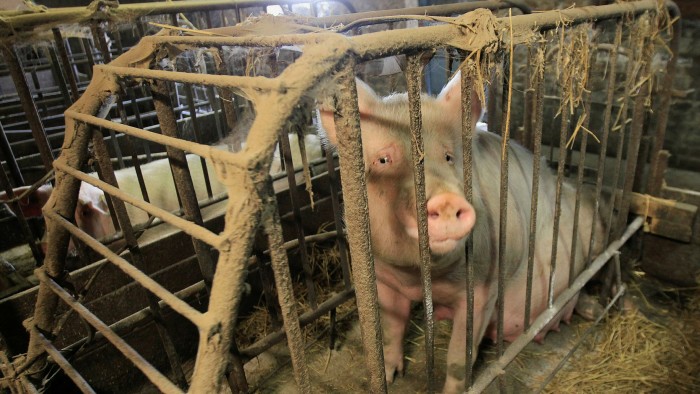Carl Icahn’s push for happier McDonald’s pigs is just the start


Roula Khalaf, Editor of the FT, selects her favourite stories in this weekly newsletter.
Who would have thought Carl Icahn would be a softie on animal rights? The feared corporate raider wants to put two directors on the board of McDonald’s to force the fast-food chain to stop confining pregnant pigs in tiny boxes.
McDonald’s promised to end this practice in 2012 but its 10-year plan has fallen short. By the end of the year, it will still buy 10 to 15 per cent of its US pork from pigs kept in what it describes as “gestational crates”. A full shift to “group housing” will take until 2024. The Humane Society pushed for a shareholder vote on the subject. But McDonald’s chief executive declined to get on the phone. “I said, they’ll call me back,” Icahn remembered.
McDonald’s icily referred to Icahn’s campaign as a “narrow issue” noting that the company buys just 1 per cent of US pork production. The company also complained that Icahn owns only 200 McDonald’s shares and has not demanded the same commitment from Viskase, the pork packaging supplier that he controls.
But companies had better start getting used to this kind of activism. Single issue charities and activist hedge funds have long sought to use US annual general meetings to demand change, and now they are getting backing from a much wider range of investors.
In last year’s proxy season, shareholders in the 3,000 largest American public companies filed a record 348 proposals on environmental and social issues and took 158 of them to a vote, according to the Conference Board. Engine No. 1 won board seats at ExxonMobil by demanding a faster shift to renewable energy, and shareholders at Netflix and five other companies voted for disclosure of political lobbying and spending.
This year is likely to be even more contentious. Not only will companies find it harder to convince a Democrat-led US Securities and Exchange Commission to let them bar such proposals from a vote, but proponents, scenting victory, will be less willing to compromise and agree to withdraw them.
Costco has the dubious distinction of being the first big US company to lose on a climate-related proposal in 2022. Nearly 70 per cent of shareholders voted to ask the big box chain to set “net zero by 2050” targets that cover its supply chain and customers.
Next week, Jack in the Box, another fast-food group, faces an investor demand for a plan to cut back on plastic packaging. And shareholders at companies including Walt Disney and Apple will be voting on whether to force them to disclose their gender and racial pay gaps. Similar fairness audit demands at Citigroup, Goldman Sachs and JPMorgan Chase drew substantial support last year, although they fell short of victory.
To CEOs, these kinds of specific demands must feel like micromanagement — and frankly, they are. But companies have only themselves to blame. For several years now, we have been hearing about “stakeholder capitalism” and how much companies care about their employees, communities and the environment. Many executives seem to believe the rhetoric: more than 80 per cent of CEOs told a recent survey that a shift to stakeholder capitalism was under way at their own companies.
But most companies still prioritise investors. A recent Harvard study looked at 116 mergers and acquisitions worth a cumulative $700bn undertaken during the Covid pandemic, when CEOs were outspoken in valuing employees. Despite their words, boards negotiated employee protections such as limits on firings in just 4 per cent of cases. By contrast, they looked after shareholder interests by negotiating a price increase 93 per cent of the time.
This may well be a matter of incentives. Almost every company ties CEO pay to investor returns. One in five links it to corporate social responsibility, up from 7 per cent in 2018.
Some companies can do well by doing good. Volkswagen’s ambitious push into electric vehicles helped boost its share price and studies suggest companies with diverse workforces perform better financially. But often there is conflict: a top Unilever shareholder last month blasted the consumer goods company, saying its focus on purpose was diverting attention from its core business.
That suggests a natural limit on what can be accomplished through shareholder resolutions and proxy fights, even those backed by prominent corporate raiders. Tougher laws are the only way to enforce higher standards across the board. McDonald’s knows that. The company has a plan to get to net zero emissions, but it went on record last October calling for comprehensive climate legislation. That would bring obligations no executive could ignore.
Comments